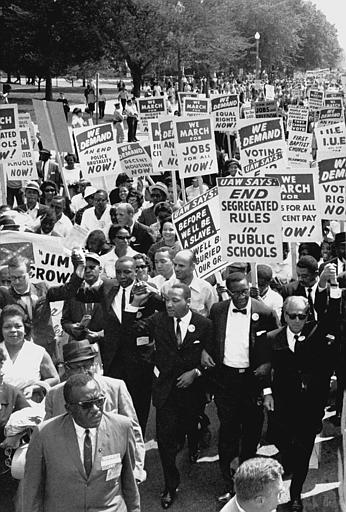A parade is an organized procession of people going from one location to another in a public area in order to make a collective point, not just to each other, but also to bystanders. Though political protests can take the form of parades, they are generally called demonstrations or marches in order to distinguish them from nonpolitical parades such as the annual Rose Parade in Pasadena, California, and the Thanksgiving Day Parade in New York City.
Courts have ruled that parades have First Amendment protection
American courts have consistently ruled that private speech that takes place in public in the form of a parade or march—even one that contains unpopular messages and excludes certain groups from participation—is constitutionally protected by the First Amendment. Neither governments nor other private groups can quash or compromise the message of the speakers and the parade.
There have been many significant political parades or marches in American history. For example, in 1963 Dr. Martin Luther King Jr. led 200,000 people from the Washington Monument to the Lincoln Memorial in the March on Washington for Jobs and Freedom, which culminated in his famous “I Have a Dream” speech.
Supreme Court has decided many cases involving parades
The Supreme Court has decided a number of cases involving parades and freedom of speech. In Gregory v. City of Chicago (1969) the Court reviewed a protest march aimed at the Chicago city government and held that as long as marches are “peaceful and orderly” they are protected by the First Amendment. Similarly, in Edwards v. South Carolina (1963) the Court protected a march of protest and pride by at least 187 African American students whose actions included carrying placards and singing The Star Spangled Banner.
Court held that proposed Nazi march was protected speech
In 1977–1978 the National Socialist Party of America (NSPA)—an offshoot of the American Nazi Party—sought to organize a march through Marquette Park in Chicago. When the city refused permission, the group turned toward the village of Skokie, a Chicago suburb and traditional home to a sizable Jewish population (40,000 out of 70,000 people) which included several thousand survivors of concentration camps.
The village took steps to prevent the march by passing a series of ordinances relating to “Parades and Public Assemblies,” including a thirty-day notice requirement, prohibition of military-style uniforms, and a requirement that groups must post an insurance bond of $350,000. The NSPA enlisted the help of the American Civil Liberties Union, and in the litigation that followed, both state and federal courts held that the proposed march was protected speech.
The Supreme Court heard various appeals on technical aspects of the case and each time ruled in favor of the neo-Nazis, for instance, in Village of Skokie v. National Socialist Party of America (1977) and Collin v. Smith (7th Cir. 1978), with certiorari denied in Smith v. Collin (1978). Ultimately, the Nazi sympathizers canceled their planned march in Skokie when the City of Chicago finally allowed them to march in Marquette Park. The case was consistent with previous free speech cases where the Supreme Court protected the rights of unpopular speakers.
Court said parade organizers could exclude groups from participating in parades
A different issue was presented in another important case involving a parade, Hurley v. Irish-American Gay, Lesbian and Bisexual Group of Boston (1995). In a unanimous opinion delivered by Justice David H. Souter, the Court held that the parade organizers—various veterans’groups—had a free speech right to exclude an Irish gay group from participating in a St. Patrick’s Day parade in Boston.
The gay group argued that their exclusion violated both the state and federal constitutions and the state public accommodations law, which prohibited “any distinction, discrimination or restriction on account of . . .sexual orientation . . .relative to the admission of any person to, or treatment in any place of public accommodation, resort or amusement.” But the Court said that being forced to include groups, such as a gay and lesbian group, would alter “the parade’s expressive content and thereby violated the fundamental First Amendment rule that a speaker has the autonomy to choose the content of his own message and, conversely, to decide what not to say.”
This article was originally published in 2009. Artemus Ward is professor of political science faculty associate at the college of law at Northern Illinois University. Ward received his Ph.D. from the Maxwell School of Citizenship & Public Affairs at Syracuse University and served as a staffer on the House Judiciary Committee. He is an award-winning author of several books of the U.S. Supreme Court and his research and commentary have been featured in such outlets as the New York Times, Los Angeles Times, Associated Press, NBC Nightly News, Fox News, and C-SPAN.

